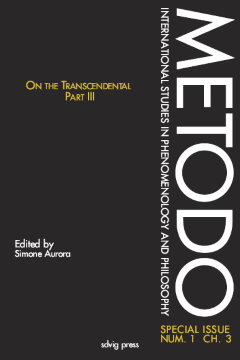Repository | Journal | Volume | Articles
Extreme obviousness and the "zero-person" perspective
why is the problem of the "primal I" fundamental for transcendental phenomenology?
Shigeru Taguchi
pp. 15-37
Transcendental reflection does not simply withdraw from natural life and go somewhere else. On the contrary, it is a self-elucidation of natural life performed within this life itself. However, natural life has an inherent automatic system for concealing itself. Therefore, in order to make manifest the truly natural state of natural life, we need a deliberate method of outfoxing the natural attitude as it constantly tries to trick us. If so, the transcendental perspective is closely related to Husserl’s perplexing concept of “primal I”. It expresses a primitive perspective of our experience that cannot be identified with the first-person perspective. Phenomenology is not merely an investigation of experience from the first-person point of view, but a philosophical thinking from a “zero person” perspective that makes it possible for us to understand the relativity of our own first-person experience, and how it is related to other first-person experiences and the third-person perspective.
Publication details
Full citation:
Taguchi, S. (2019). Extreme obviousness and the "zero-person" perspective: why is the problem of the "primal I" fundamental for transcendental phenomenology?. Metodo 1.3, pp. 15-37.
This text is available for download in the following format(s)
This document is available at an external location. Please follow the link below. Hold the CTRL button to open the link in a new window.




